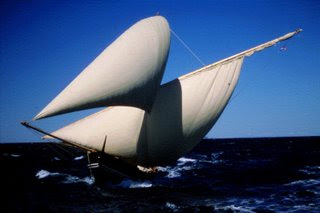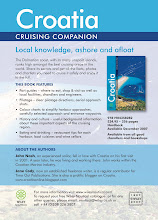 Today's photo shows the Gajeta Falkuša, a traditional Dalmatian fishing boat that was placed on UNESCO's World Heritage List in 1998. It was reconstructed for the Lisbon EXPO exhibition in the same year and is currently wintering in Marina Kaštela.
Today's photo shows the Gajeta Falkuša, a traditional Dalmatian fishing boat that was placed on UNESCO's World Heritage List in 1998. It was reconstructed for the Lisbon EXPO exhibition in the same year and is currently wintering in Marina Kaštela. During the summer it can be seen in Split Harbour where it is available for day and multi day tours which provide an immersion in the old fishing life of the region - guests are given lectures on the maritime heritage of Dalmatia, taught to cook authentic Dalmatian food and instructed on rowing or sailing the boat.
The boat originates from Komiža on Vis island which, from the 16th century onwards, was one of Dalmatia's most prosperous fishing villages. The fishermen maximised their catches by fishing in the open sea and needed a boat that would suit all weather conditions. Thus the hull of the Falkuša was built exclusively from pine from the island of Svetac - a volcanic island exposed to frequent strong winds which resulted in pine wood that was exceptionally tough and durable. In still conditions, the boat comes equipped with a set of oars.
Komiža on Vis remains one of our favourite places. For sailors, the well equipped visitors berths have lazylines (for mooring bow or stern to), electricity and water. Nearby there's a laundry, and toilet and shower facilities, and in the compact centre a number of good restaurants and bars. Around the bay from the visitors moorings is Konoba Bako, a great restaurant with its own beach and a small archaelogical collection.
Visit Lifejacket Adventures for more information about trips on the Falkuša and www.konobabako.hr for information on Konoba Bako. For more details of what Vis Island has to offer onshore and for for those that are visiting by ferry, visit our sister site www.croatiaonline.blogspot.com, direct link Croatia Online - Vis Revisited
Thanks to Lifejacket Adventures for today's photo.


2 comments:
As an experienced sailor I can see how brilliantly the falkusa is adapted to local conditions. The sails being loose footed can be dropped very easily or reefed in a squall and they seem to have the lifting power needed to drive over the short Mediterranean seas, with their loose footed big bellies. A wonderful boat that i would like to have for myself. I hope I can have a chance to sail on one, with no need for a motor. s.j.baddeley@bham.ac.uk
Thanks for the comment Simon. Let us know if you ever go to Croatia and I'm sure we can track a Falkusa down for you to try!
Post a Comment